Restaurant Review
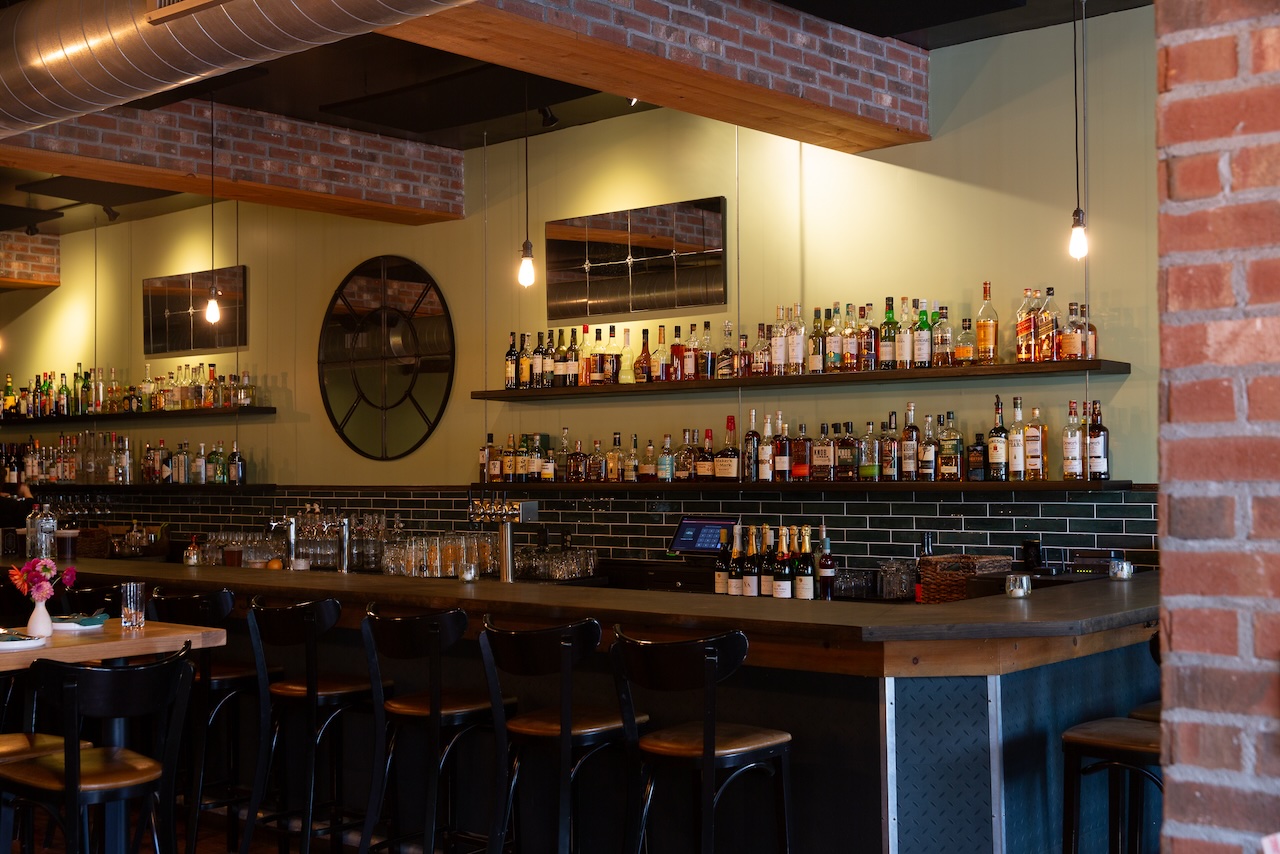
Come Dine and Experience Willa, the Newest Eatery in Millerton, NY
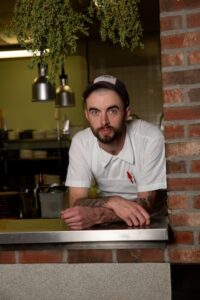
Chef Daniel Meissner. Photo by Colin Bazzano.
When the town of Millerton, NY, and its environs learned that 52 Main bartenders Alanna Broesler and Jim Buhs were buying the business and opening a new restaurant in its place, it was as if the entire community breathed a huge sigh of relief. Relief because, as we all know, it’s one of the few places of its kind in town. But also because Alanna and Jim always made us feel not just welcome, but known. They genuinely cared about their patrons and connecting to the community. Alanna and Jim have brought this same community ethos to their approach to the food they serve at Willa. They do this by sourcing locally, building relationships with the farmers, and serving creative, delicious food that “showcases the hard work of these individuals.”
I recently had a chance to catch up with Willa’s Executive Chef, Daniel Meissner, and learn about his history, his approach to food and its relationship to farming, and his intentions for Willa.
Tell us about yourself and your background. How did you first become interested in becoming a chef?
I was born in New Milford, CT, and grew up in Salisbury. I’ve been local for quite some time.
Growing up, my dad always used to get me cookbooks and in eighth grade, I decided I wanted to become a chef. I got my first job with Serge Madikians at Serevan the summer after eighth grade. Serge had me jumping right into making salads and desserts. I learned about seasoning and basic kitchen fundamentals, it was a good solid foundation to stand on.
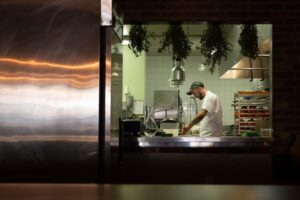
Daniel in the kitchen at Willa. Photo by Colin Bazzano.
I really thrived in the kitchen, it felt like a family, a place where I belonged and could be myself. I never had a lot of routine growing up, and the kitchen provided me with that. There is an instant gratification that comes from working in a kitchen – if you dice an onion really well, or make a really delicious salad, there is an immediate sense of satisfaction that it gives you. Restaurant kitchens provide a safe space for people who maybe feel like they don’t belong anywhere. The misfits of life convene in the kitchen.
I went to the French Culinary Institute in Manhattan, after which I did an internship at NOMA in Denmark. I thought I was ready for NOMA, but I wasn’t. I don’t regret it, it was amazing and shaped the direction of my career. But it was definitely a tough thing, and if I was going to do it all over again, I would have worked at a comparable restaurant in NYC to really understand the level that they were striving for. People say kitchens are similar to the military and it’s true. It is very disciplined, you have to be executing in a timely manner, and if you don’t hit the time constraints it can throw the whole day off.
I came back to the States and worked at a great restaurant called Community Table in Washington Depot. Then I went on to work at The Finch in Brooklyn where Gabe McMackin was the chef. Gabe had hired me on the spot, largely due to the fact I grew up a few towns over from where he grew up in Connecticut. The Finch was the NYC experience that I should have had before going to NOMA. It was intense, a lot of fun, and very thoughtful about sourcing ingredients. The Finch really molded me and shaped who I am. Gabe’s cooking style is very go with the flow and if he wants to change something on the fly he will do that. That is a skill that is truly priceless.
After The Finch, I helped open Swyft in Kent, CT. It was a great experience for me because I was the pizzaiola there. I learned everything from making the sourdough to stretching the cheese to making the sauce. Swyft shaped a part of my career where I could appreciate the simplicity of food. More ingredients doesn’t necessarily mean a better product. I left Swyft for an opportunity to cook in Sweden at Faviken, a small fine dining restaurant.
Gabe McMackin had moved onto Troutbeck and reached out to me. I went and toured the property and I fell in love with it. Troutbeck is a magical place. It was a great time. During this time I also met my partner, Ellie, who worked at Stonewood Farm in Millbrook.
It was very challenging to work in a hotel – we did breakfast, lunch, dinner, room service, weddings, pool service, and corporate banquets. After two-and-a-half years, I was ready to move on. I had to ask myself, “how do I use my skill set to provide for myself but not kill myself?” That’s when I started private cheffing. I could work once a week and still pay rent and have a normal life outside of cooking. It was exactly what I was looking for at the time.
Private cheffing is a wonderful thing, but there is no creativity involved. People want you to make roast chicken and mac and cheese for their kids. I learned a lot about making do with not much – you can show up somewhere and all they have is just one pan and one pot and you have to figure out how to utilize the limited resources.
From there, I moved on to Stonewood Farm and helped them start their culinary program. After a year, Ellie and I had an opportunity to lease land and start our own farm, so we jumped on it. We now sell at the Millerton Farmers Market every Saturday during the summer. We also sell our produce to local establishments like Troutbeck, Vitsky Bakery, Willa, The White Hart, Westerly Canteen, and Champetre.
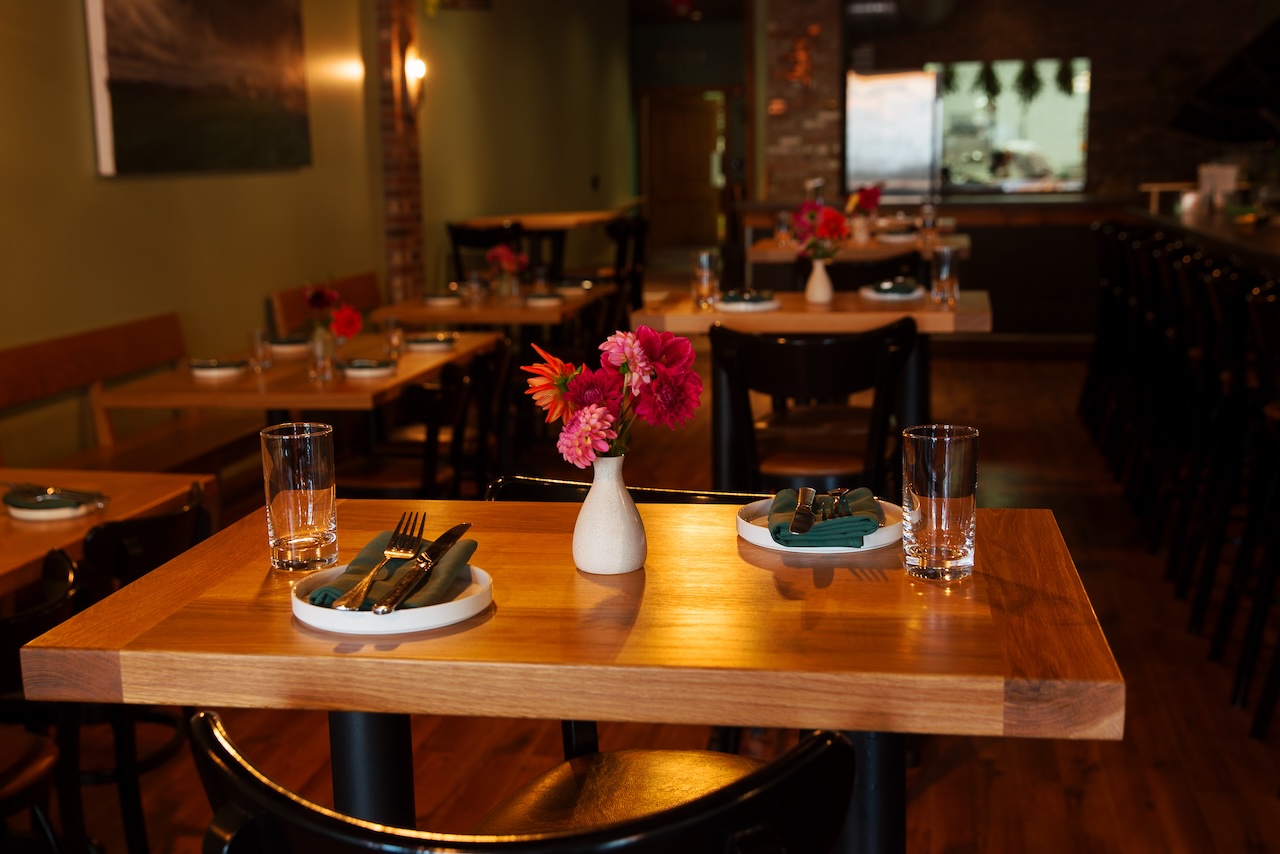
Table setting at Willa. Photo by Colin Bazzano.
How did you get involved with Willa?
I was in the bar one day talking to Jim and he told me that he and Alanna were thinking about purchasing the restaurant and he said he needed a chef. Initially I was unsure about it because I didn’t know if I wanted to go back to cheffing. The farm was a whole other experience where I realized there was life outside the kitchen. Being a farmer is hard work, but it is very satisfying. You get to be outside all day. I haven’t had that in years.
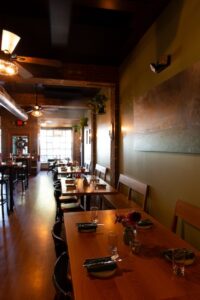
Photo by Colin Bazzano.
But the more I thought about it, the more I felt like it made sense, especially with Thistle Pass being a place I could directly source vegetables from. And, since Ellie and I are in a relationship, the legwork is a lot easier. It’s not usually that easy to get a hold of the chefs at restaurants, as they often wear many hats.
The term “farm- to- table” gets thrown around a lot, what does it mean to you?
Oftentimes, restaurants need a lot of volume if they are not changing their menu frequently. Farmers, especially in this area, don’t always have a lot of the same things – they do a run and it’s done. For example, Ellie has produce that she really loves to grow and that she will grow large quantities of. But she’ll also research some unique, special vegetables and she’ll grow 4-5 plants to experiment with it. Right now, Ellie is growing an eggplant called Summer Emerald. It has a green skin instead of purple and it looks unripe, but it’s not. Supposedly, it is super delicious and has better flavor than most eggplants.
What we are focusing on at Willa is sourcing locally which means we utilize those small batches of seasonal vegetables. We’ll try some new dishes, and get a better understanding of the vegetable and the product itself. That’s useful information for the farmer, – “we tried cooking it ten different ways and this way was the tastiest. If you want to grow it next year, we will buy it.”
And then the farmers can bring the vegetables to their market customers with the knowledge of what the local chefs do. To give someone a simple recipe, with a vegetable they’ve never cooked before, and give them the confidence to make a delicious meal at home, it can be very gratifying.
How does Ellie’s approach to farming relate to what you are doing in the kitchen at Willa?
Ellie has an art background, she is creative, and the fields are like a canvas to her. She is always interested in preserving culture, she really loves to study and do deep dives into the background of the things that she is growing, its heritage and why people are growing it. For me, connecting Thistle Pass Farm to the kitchen at Willa is an opportunity to bring Ellie’s creativity into the kitchen and build upon it with seasonal ingredients and dishes.
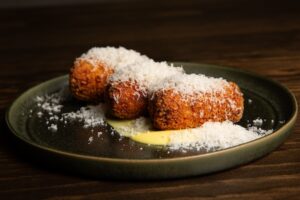
Photo by Colin Bazzano.
What is your approach to your customers?
At a restaurant, customers are paying for a great meal but they are also paying for an unforgettable experience. It’s our job to make people forget for a brief period of time about their life outside the restaurant and show them a good time.
We are trying to talk to customers about the food and the product, and the thought and the care that is behind it. To me, that’s what sells the product. I can make the tastiest caesar salad and Jason can make the best pasta, but the story of where the ingredients are sourced – where is the lamb being raised and where are the eggs coming from, brings so much more to the customer’s experience.
My goal as a chef is to educate people about not just what we are doing here, but all of the people’s lives that this restaurant and other restaurants support so that the people behind the scenes can also have a paycheck and eat out and enjoy their lives.
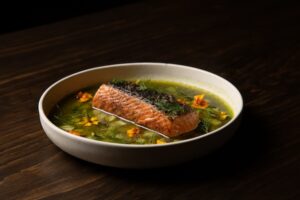
Photo by Colin Bazzano.
Willa sources from:
Averill Farm
Chaseholm Farm
Foxtrot Farm & Flowers
Kinderhook Farm
Hudson Valley Fisheries
6 Acre Farm
Thistle Pass Farm
Tivoli Mushroom Co.
Wild Hive Farm
Willa is located at 52 Main Street in Millerton, NY. https://www.willabar.com/
